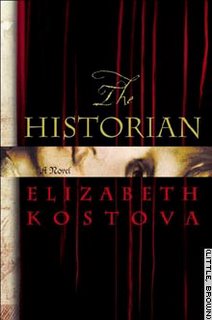Amsterdam, 1972: A teenage girl stumbles upon an odd book in her father's library. Every page in the book is blank, save for the center. On it is a woodcut of a mysterious dragon. In the dragons claws is a banner which reads, "Drakulya." A short time later, the girl's father goes missing and all that is left behind is the strange book and a series of letters that her father has left to her, his "unfortunate successor." As she reads the letters left to her, the girl realizes that her father is on the trail of more than simply a bit of obscure history; rather, this "history" is very much alive and it is up to her to unravel the mystery surrounding Vlad the Impaler--"Dracula"--before the mystery destroys all that she loves and cherishes.
page in the book is blank, save for the center. On it is a woodcut of a mysterious dragon. In the dragons claws is a banner which reads, "Drakulya." A short time later, the girl's father goes missing and all that is left behind is the strange book and a series of letters that her father has left to her, his "unfortunate successor." As she reads the letters left to her, the girl realizes that her father is on the trail of more than simply a bit of obscure history; rather, this "history" is very much alive and it is up to her to unravel the mystery surrounding Vlad the Impaler--"Dracula"--before the mystery destroys all that she loves and cherishes.
I quite enjoyed The Historian. Kostova has an engaging writing style which captures the imagination and enraptures the senses. Her descriptions are vivid and crisp, surrounding the reader with the sights, smells and sounds of the various locales which the characters patronize.
Morever, Kostova has a beautiful and seemingly innate sense of timing, as the mystery is unraveled slowly, yet in such a way that the reader continually feels that the answer is just a page away. Furthermore, the scope of the adventure is such that it has an epic feeling while concomitantly maintaining a certain range of believability that allows this novel to feel at home in the world of the historical.
Despite these acheivements, Kostova's book does fail, in my opinion, on at a couple of minor points. The first involves the mechanism of the narrative. Almost the entire story is contained within the letters which the girl finds addressed to her from her father. At first, this is an interesting literary device. However, as the story progresses, it becomes somewhat cumbersome. Moreover, it is difficult to believe that the incredible depth of description with which Kostova writes would be communicated through letters. At times, it feels as if the writer of the letters has transcripts from he is recalling various events, and the scope of his writing often feels as if he himself is writing a book, not attempting to relate valuable information to aid the "unfortunate successor."
Another minor failing of the narrative is the utter unlikelihood of many of the key turning points in the book. There are times within the narrative in which it seems entirely impossible that the story can go forward. However--and fortuitously, some random event always occurs to allow the narrative to continue. The first twist was exciting, and I was pleasantly amused at how the efforts of the "scholars" were trumped by simple dumb luck. However, after about the third completely random "plot saver," I was quite dissolusioned and was ready for the story to finally be resolved--I couldn't stomach another (but of course, more did come).
Notwithstanding these critiques, Kostova's work is an exceptional peice of writing. Smart and exciting, it will keep the reader engaged right up until the end.
Happy reading!

Edit: For a brief historical sketch of Vlad the Impaler (a.k.a Drakulya, the subject of the book's plot), see this website.
 page in the book is blank, save for the center. On it is a woodcut of a mysterious dragon. In the dragons claws is a banner which reads, "Drakulya." A short time later, the girl's father goes missing and all that is left behind is the strange book and a series of letters that her father has left to her, his "unfortunate successor." As she reads the letters left to her, the girl realizes that her father is on the trail of more than simply a bit of obscure history; rather, this "history" is very much alive and it is up to her to unravel the mystery surrounding Vlad the Impaler--"Dracula"--before the mystery destroys all that she loves and cherishes.
page in the book is blank, save for the center. On it is a woodcut of a mysterious dragon. In the dragons claws is a banner which reads, "Drakulya." A short time later, the girl's father goes missing and all that is left behind is the strange book and a series of letters that her father has left to her, his "unfortunate successor." As she reads the letters left to her, the girl realizes that her father is on the trail of more than simply a bit of obscure history; rather, this "history" is very much alive and it is up to her to unravel the mystery surrounding Vlad the Impaler--"Dracula"--before the mystery destroys all that she loves and cherishes.I quite enjoyed The Historian. Kostova has an engaging writing style which captures the imagination and enraptures the senses. Her descriptions are vivid and crisp, surrounding the reader with the sights, smells and sounds of the various locales which the characters patronize.
Morever, Kostova has a beautiful and seemingly innate sense of timing, as the mystery is unraveled slowly, yet in such a way that the reader continually feels that the answer is just a page away. Furthermore, the scope of the adventure is such that it has an epic feeling while concomitantly maintaining a certain range of believability that allows this novel to feel at home in the world of the historical.
Despite these acheivements, Kostova's book does fail, in my opinion, on at a couple of minor points. The first involves the mechanism of the narrative. Almost the entire story is contained within the letters which the girl finds addressed to her from her father. At first, this is an interesting literary device. However, as the story progresses, it becomes somewhat cumbersome. Moreover, it is difficult to believe that the incredible depth of description with which Kostova writes would be communicated through letters. At times, it feels as if the writer of the letters has transcripts from he is recalling various events, and the scope of his writing often feels as if he himself is writing a book, not attempting to relate valuable information to aid the "unfortunate successor."
Another minor failing of the narrative is the utter unlikelihood of many of the key turning points in the book. There are times within the narrative in which it seems entirely impossible that the story can go forward. However--and fortuitously, some random event always occurs to allow the narrative to continue. The first twist was exciting, and I was pleasantly amused at how the efforts of the "scholars" were trumped by simple dumb luck. However, after about the third completely random "plot saver," I was quite dissolusioned and was ready for the story to finally be resolved--I couldn't stomach another (but of course, more did come).
Notwithstanding these critiques, Kostova's work is an exceptional peice of writing. Smart and exciting, it will keep the reader engaged right up until the end.
Happy reading!

Edit: For a brief historical sketch of Vlad the Impaler (a.k.a Drakulya, the subject of the book's plot), see this website.
1 comment:
I was quite pleased to see the variety and depth of your space. You truly offer some interesting insights on a range of topics, and I look forward to staying up with your philosophical progressions.
Post a Comment